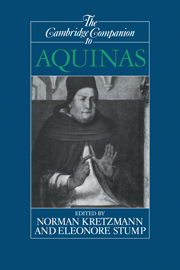Book contents
- Frontmatter
- Introduction
- 1 Aquinas's philosophy in its historical setting
- 2 Aristotle and Aquinas
- 3 Aquinas and Islamic and Jewish thinkers
- 4 Metaphysics
- 5 Philosophy of mind
- 6 Theory of knowledge
- 7 Ethics
- 8 Law and politics
- 9 Theology and philosophy
- 10 Biblical commentary and philosophy
- Bibliography
- References to Aquinas's Works
- Index
3 - Aquinas and Islamic and Jewish thinkers
Published online by Cambridge University Press: 28 May 2006
- Frontmatter
- Introduction
- 1 Aquinas's philosophy in its historical setting
- 2 Aristotle and Aquinas
- 3 Aquinas and Islamic and Jewish thinkers
- 4 Metaphysics
- 5 Philosophy of mind
- 6 Theory of knowledge
- 7 Ethics
- 8 Law and politics
- 9 Theology and philosophy
- 10 Biblical commentary and philosophy
- Bibliography
- References to Aquinas's Works
- Index
Summary
The work of Thomas Aquinas may be distinguished from that of many of his contemporaries by his attention to the writings of Moses Maimonides (1135-1204), a Jew, and Ibn Sina (Avicenna) (980- 1037), a Muslim. His contemporaries, especially in Paris, were responsive to the work of another Muslim, Ibn Rushd (Averroes) (1126-1198), for his rendition of the philosophical achievements of Aristotle, but Aquinas's relation to Averroes and to those who took their lead from him was far more ambivalent. Aquinas respected Rabbi Moses and Avicenna as fellow travelers in an arduous intellectual attempt to reconcile the horizons of philosophers of ancient Greece, notably Aristotle, with those reflecting a revelation originating in ancient Israel, articulated initially in the divinely inspired writings of Moses. So while Aquinas would consult “the Commentator” (Averroes) on matters of interpretation of the texts of Aristotle, that very aphorism suggested the limits of his reliance on the philosophical writings of Averroes, the qadi from Cordova. With Maimonides and Avicenna his relationship was more akin to that among interlocutors, and especially so with Rabbi Moses, whose extended dialectical conversation with his student Joseph in his Guide of the Perplexed closely matched Aquinas’s own project: that of using philosophical inquiry to articulate one's received faith, and in the process extending the horizons of that inquiry to include topics unsuspected by those lacking in divine revelation.
- Type
- Chapter
- Information
- The Cambridge Companion to Aquinas , pp. 60 - 84Publisher: Cambridge University PressPrint publication year: 1993
- 9
- Cited by



